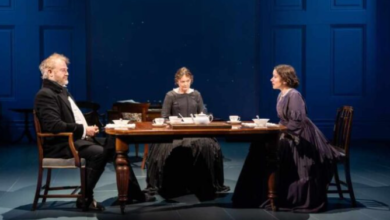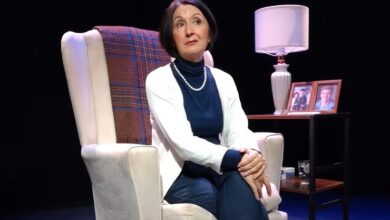A highly topical debate about brain injuries and medical ethics is cleverly presented but more attention needs to go into the small details to allow it to grow. Summary
Rating
Good
When Harry (Laurence Ubong Williams) approaches Frances (Annabelle Brown) for help he places her in a moral dilemma. Because Frances is involved in research for dementia treatment, and whilst Harry isn’t old and frail, as you’d expect dementia sufferers to be, his years as a professional rugby player have left him with chronic traumatic encephalopathy, a condition that has serious long-term consequences. It’s a highly topical subject. More and more is being discovered about repeated impact and the damage done to players. Even in football, there are concerns over the repeated heading of the ball.
Impulse takes this central theme of brain damage in ex-players and attempts to turn it into a moral dilemma; Frances must decide between helping a friend or adhering to the rules governing medical research. She knows that Harry doesn’t have the time left to wait for the research to be turned into actual available treatment, and she knows Harry will never be eligible for the trials as he doesn’t fit the criteria for the dementia studies. So instead, she agrees to treat him secretly and behind the back of Grace (Charlie Cameron), the head of the research project. The problem is, in doing so she risks everything they have been working on if anyone ever finds out.
It’s obvious just how much research writer George Almond has put into Impulse. Monologues between scenes describe the brain, how it functions and how easily it can be damaged. These are wonderfully written and delivered, reaching a peak when ribbons are introduced to show how the parts of the brain connect and can be disconnected, and what medical research aims to do to treat impairment. Yet as precise as these monologues are, it feels a little less attention has gone into the small details of the actual storyline, leaving some glaring oversights that begin to nag, overshadowing the central debate the play is trying to have.
Perhaps because of this and perhaps because of how the characters are presented, it is a struggle to feel the empathy required to care about Harry’s fate. It’s not helped when having built up the whole argument on empathy over objectivity, without any real warning the end turns into a debate on male violence, and whether we should view it in the context of brain injuries and thus not the man’s fault… There’s certainly room to debate this but to drop it in at the very end doesn’t quite make sense given everything that has gone before.
Plot issues aside, the actual performance has lots to admire, especially Brown’s torn scientist, wrestling with the emotional blackmail of her old friend and her desire to see the research bring results. Tobias Deacon’s direction helps bring the performances to life, ensuring that the in-the-round configuration is utilised fully. Even during her monologues, Brown glides from corner to corner of the stage so she never has her back to anyone for a prolonged period. The placing of the desk, the only real piece of set, is also carefully considered to allow views from all four sides. Bella Merrill’s sound, full of white noise and screeching notes, acts as the soundtrack of a dysfunctional brain.
There’s plenty to admire within Impulse, but when you are trying to tackle such a heavy subject, the small details matter. In its current state, these details drag down the hard work put in elsewhere. But there’s no doubt these can be ironed out to present a more satisfactory show after Camden Fringe.
Written by George Almond
Directed by Tobias Deacon
Sound design by Bella Merrill
Produced by: POH Productions and Theatre Lab Company
Impulse plays at The Cockpit until Wednesday 6 August.






